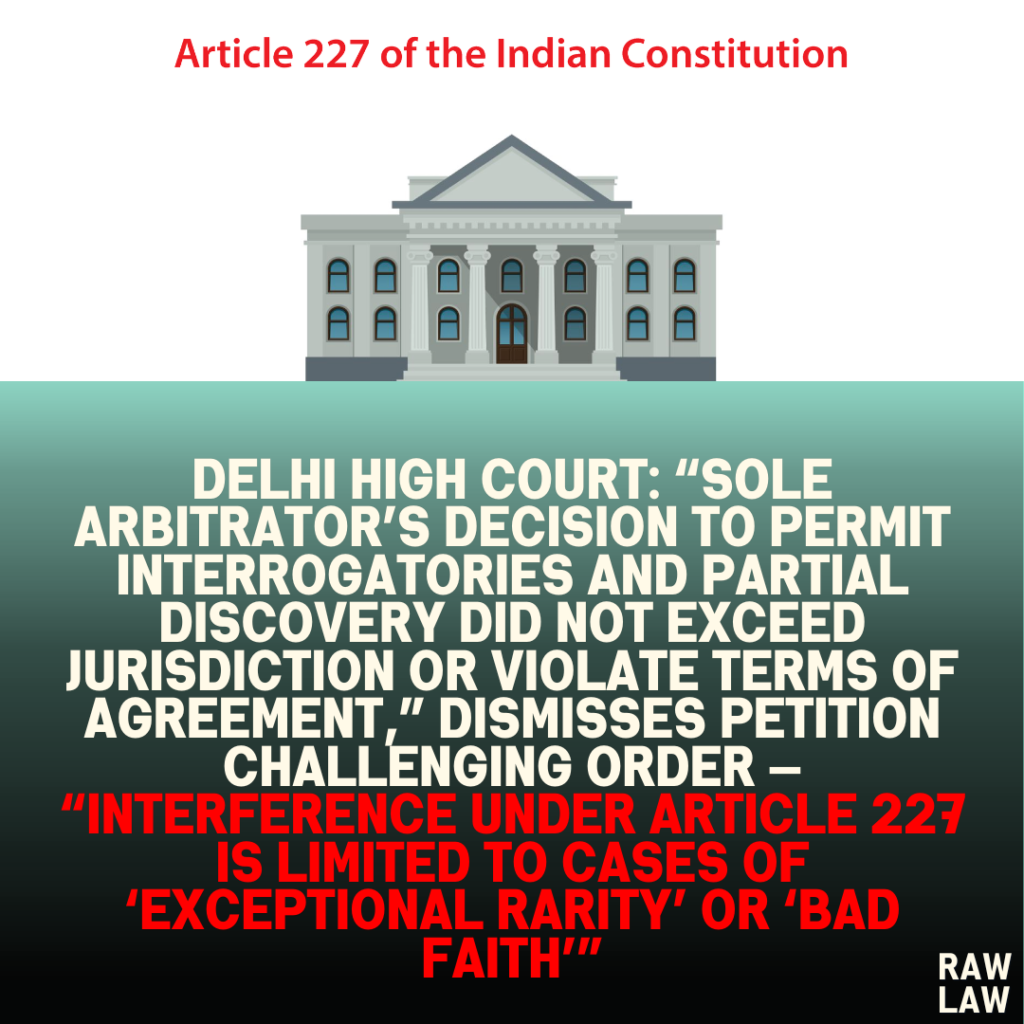Court’s Decision
The Delhi High Court dismissed the petitions challenging the interlocutory order passed by the Sole Arbitrator, which allowed the respondent’s application for delivery of interrogatories and partial discovery and production of documents. The court held that the scope of interference under Article 227 of the Constitution is extremely narrow and should only be invoked in cases of ‘exceptional rarity,’ ‘extreme perversity,’ or where there is a hint of ‘bad faith.’ The Court concluded that the impugned order did not suffer from any jurisdictional error or perversity.
Facts
The case involves two Claim Petitions filed by the respondent against the petitioner, related to a dispute over the non-fulfillment of obligations under two agreements for the allotment of residential plots in Ghaziabad, Uttar Pradesh. The petitioner, the seller, had entered into agreements with the respondent for the allotment of two specific plots, Plot No. 129 and Plot No. 130, as part of a larger township development project named “Aditya World City.” The seller claimed to have acquired majority possession of the project land, with the remaining parcels to be acquired by the Ghaziabad Development Authority (GDA) and subsequently transferred to the seller. Despite payments being made by the buyer, possession of the plots was never handed over due to issues with land acquisition.
The respondent (buyer) claimed that the seller never communicated its inability to hand over possession and sought specific performance of the agreement or alternatively, compensation. In response, the seller argued that the agreements had been frustrated due to the failure of the governmental authorities to acquire the remaining land. The buyer contended that the seller exhibited disinclination and indifference, leading to the invocation of arbitration.
Issues
- Whether the Sole Arbitrator’s order permitting interrogatories and partial document discovery was beyond the scope of the arbitration agreement.
- Whether the Delhi High Court could intervene under Article 227 of the Constitution in the arbitral proceedings.
Petitioner’s Arguments
The petitioner argued that the Sole Arbitrator’s order granting interrogatories and discovery was beyond the terms of the arbitration agreement, which specifically excluded the buyer’s rights over other unsold plots within the same project. It was contended that permitting interrogatories to ascertain the status of other unsold plots amounted to granting relief outside the scope of the arbitration agreement. Further, the petitioner claimed that such an order led to a scenario where the respondent could seek specific performance or other remedies beyond what was contractually agreed.
The petitioner emphasized that the Arbitral Tribunal lacked jurisdiction in entertaining such applications for interrogatories and document production because the agreement expressly barred the buyer from making any such claims. It was also contended that the impugned order was without jurisdiction and suffered from bad faith, thereby justifying the intervention of the Court under Article 227 of the Constitution.
Respondent’s Arguments
The respondent argued that the information sought was crucial for the proper adjudication of the dispute, as it was directly related to the seller’s defense that similarly situated plots were available. The respondent further contended that the Sole Arbitrator was well within his jurisdiction to allow the interrogatories and directed production of relevant documents. The respondent denied the seller’s claim that any alternative plots had been offered and insisted that the discovery was essential to establish the seller’s conduct.
Analysis of the Law
The Court referred to several precedents, emphasizing the limited scope of interference under Article 227 in arbitral matters. Citing Puri Investments v. Young Friends and Co. & Ors. and Estralla Rubber v. Dass Estate (P) Ltd., the Court reiterated that judicial intervention is permissible only in cases of “exceptional circumstances” or where the order impugned suffers from extreme perversity or bad faith. The Court also relied on IDFC First Bank Ltd. v. Hitachi MGRM Net Ltd. and Surender Kumar Singhal v. Arun Kumar Bhalotia, reiterating the need for restraint in interference with arbitral proceedings.
Precedent Analysis
The Court noted that while judicial intervention in arbitral matters under Article 227 is permissible, it should only be invoked in the rarest of circumstances. The scope of interference is limited to instances where the order is manifestly perverse or lacks jurisdiction. The Court distinguished between permissible judicial interference during the pendency of arbitral proceedings and challenges that can be made post-award under the Arbitration and Conciliation Act, 1996.
Court’s Reasoning
The Court observed that the Sole Arbitrator’s decision to permit interrogatories and partial discovery did not exceed his jurisdiction or violate the terms of the agreement, as the buyer was not claiming rights over the other unsold plots but merely seeking information regarding their status. The Court rejected the petitioner’s argument that allowing interrogatories and discovery equated to granting substantive relief. It further noted that the petitioner’s reliance on specific clauses of the agreement was misplaced, as the dispute was not about the buyer’s entitlement to the plots but about ascertaining relevant facts for the arbitration.
Conclusion
The Delhi High Court dismissed the petitions, holding that the impugned orders did not suffer from any jurisdictional error, bad faith, or perversity that warranted the exercise of the Court’s power under Article 227. The Court emphasized that the petitioner failed to show any compelling reason to intervene in the interlocutory orders passed by the Sole Arbitrator.
Implications
The judgment reaffirms the limited scope of interference by the High Courts in arbitral proceedings, particularly under Article 227. The decision underscores that judicial intervention should be restricted to cases of exceptional rarity or where there is clear evidence of bad faith or lack of jurisdiction. This ruling serves as a reminder that arbitral tribunals have broad discretion in managing procedural aspects of arbitration, including the scope of interrogatories and document production.




Pingback: Jammu & Kashmir High Court Enhances Compensation After Finding Error in Deduction for Personal Expenses: “Deceased Treated as Married Instead of a Bachelor, Resulting in Incorrect Compensation Calculation” – Court Applies Supreme Court's Pr